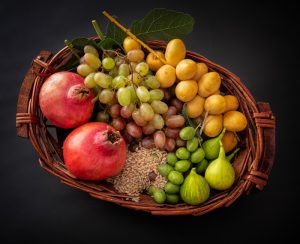
There are many ways for Christians to “give an answer to everyone who asks you to give the reason for the hope that you have” (1 Peter 3:15). Since we celebrate Thanksgiving this month, let us focus on one of the best ways to witness to the truths of the Gospel – Thanks-Living, by which we demonstrate to the watching world that we are more thankful for the Giver of the gifts than the gifts themselves.
Here is one of the best examples in all of sacred Scripture of what Thanks-Living looks like in a child of God.
“I heard and my heart pounded, my lips quivered at the sound; decay crept into my bones, and my legs trembled. Yet I will wait patiently for the day of calamity to come on the nation invading us. Though the fig tree does not bud and there are no grapes on the vines, though the olive crop fails and the fields produce no food, though there are no sheep in the pen and no cattle in the stalls, yet I will rejoice in the Lord, I will be joyful in God my Savior. The Sovereign Lord is my strength . . .” (Habakkuk 3:16-19).
Historical context
The prophet Habakkuk lived in Judah during the reign of Jehoiakim and prophesied in the time between the fall of Nineveh (612 BC) and the Babylonian invasion and eventual captivity of God’s people in 588 BC. The prophet cried out to God, trying to understand why He would use the pagan and wicked Babylonians as an instrument of judgment against God’s people, even in the midst of their rebellion and their sin. Yet even as God’s judgment was looming over His people, He gave His prophet reason to hope in what seemed to be an utterly hopeless situation. God was going to judge His people, but He would ultimately restore them when His perfect purpose was fulfilled.
We have to go back in time and recall that Israel’s culture was steeped in farming and agriculture in order to understand the devastation of God’s judgment upon His people. The staples of Israel’s diet, which included figs, grapes, olives and grain, were all going to disappear. Cattle and sheep would be gone. God’s promised coming judgment would take the form of a barren wasteland that in no way could be mistaken for mere happenstance. The utter devastation of Judah would bear solemn witness to the sovereign power and authority of Almighty God. The Creator and Sustainer of the universe would make it crystal clear that it is Father God, not “mother nature,” who controls everything, including the failure of the crops and the death of the animals.

Notice how Habakkuk opened this passage: the prophet was reduced to a sense of utter inadequacy in the presence of God. His heart pounded, his lips quivered, and his body was weakened to the point that his legs trembled when God revealed how He intended to use a pagan nation to discipline His own people. And as the prophet focused on the coming calamity, he was physically shaken to his core. Isn’t that true of all of us when we focus on the storm winds as they begin to blow in our lives?
But then Habakkuk shifted his focus away from the coming judgment and looked to the One who judges justly: the Lord, his God. And as he beheld the glory of God, the prophet responded in the face of the impending destruction on his nation with Thanks-Living: “Yet I will rejoice in the Lord,” Habakkuk said, “I will be joyful in God my Savior. The Sovereign Lord is my strength.”
Habakkuk knew the secret to Thanks-Living: It is not rooted in the good gifts God gives, but rather in God Himself. Instead of staring gloomily at the times of starvation that were on the horizon, Habakkuk stared at his Savior God. He chose to rejoice, in spite of the circumstances. British biblical scholar, F.F. Bruce put a sharp point on this powerful way of living life even when life is hard to live:
“It is right and proper to voice appreciation (thanks for) God’s goodness when he bestows all that is necessary for life, health and prosperity. But when these things are lacking, to rejoice (giving thanks) in God for his own sake is evidence of pure faith.”
Beyond circumstance
That is what I call Thanks-Living: Giving thanks regardless of the circumstances we are facing. You see, if we believe that all things work together for our good as disciples of our Lord Jesus Christ, as Romans 8:28 promises, then we will see any scarcity, lack, calamity, difficulty, storm wind or wave of challenge as an instrument of sanctification in God’s mighty right hand. Now, we won’t rejoice in the reason for the painful providence we are experiencing – we are only human, after all! But we should surely rejoice in the results of it, because God has promised to work it all together to make us more like Jesus. The joy of the Lord was Habakkuk’s strength, and it is our strength as well.
So remember, when your circumstances are changing, and even changing for the worse, your God is unchanging. In theological terms this is called God’s immutability. The writer of Hebrews puts it this way, “Jesus Christ is the same yesterday and today and forever” (Hebrews 13:8). Jesus was for you. Jesus is for you. Jesus will be for you forever and ever. That alone should empower every child of God to be filled with Thanks-Living regardless of the ever-changing circumstances we face on this side of heaven.
Have a wonderful Thanksgiving!
This is the Gospel. This is grace for your race. NEVER FORGET THAT . . . AMEN!
 Dr. Tommy Boland is senior pastor of Cross Community Church in Deerfield Beach (www.thecrosscc.org). He blogs regularly at tommyboland.com. For more articles by Dr. Tommy Boland, visit goodnewsfl.org/tommy-boland.
Dr. Tommy Boland is senior pastor of Cross Community Church in Deerfield Beach (www.thecrosscc.org). He blogs regularly at tommyboland.com. For more articles by Dr. Tommy Boland, visit goodnewsfl.org/tommy-boland.

Comments